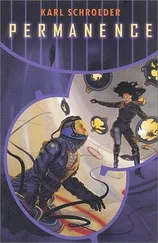"Oh, I slept there with you the first night," she said, looking down at her work. Her hair hid her face. "You were so cold, I thought you might not survive till morning. The last few times, I've used the table. With some quilts on it, it's quite fine. The bed's mattress is only straw, anyway."
Armiger imagined her lying on the table, like a body in state. He pushed the image deliberately out of his mind.
"I'm sorry to be a burden to you," he said stiffly.
Megan frowned. "Don't talk like that. It's no trouble, all else I have to take care of is me. And I am fine. Anyway... what else could I do?"
"I was dying," he said, wondering at the thought. "You saved me."
"I've tended the dying before," she said. "Last time, with no hope he'd recover. I had not that hope this time, either. So I am happy, you see, if I could save someone." Her face fell as she thought of something. "At least this time..."
"You lost someone close to you?" He looked around, noticing the fine wooden table and bed-frame. "Your husband."
Megan nodded as she reached for more down. "You see I know about losing things. And about trying to keep them." She looked at him, almost fiercely. "You always lose it in the end—what you want to keep. The harder you try to keep it the more it goes. So now I know how to keep things right."
"How is that?"
"You can never keep a whole thing. But you can keep a part of anything." She looked sadly at the wooden cupboard. "Be it only a piece of furniture. And if you can learn to be content with that, then you can let anything go." Megan stood and walked to the cupboard. She smoothed her hand over the fine wood grain. "I would sit and watch him as he made this. He spent so much time on it. We were in love. When you lose your husband, you think you've lost everything—nothing has any value any more. Funny, how long it took to know that this was still here, and other little things. The parts of him I could keep."
She shrugged, and turned to Armiger. "And what have you lost?"
He felt a surge of rage at the mindless presumption of the question. As if she could comprehend what he'd lost! Well, maybe to her, losing her husband was the equivalent of his own disaster. "I lost my army," he said.
Megan laughed. "And nearly your life. But soldiers don't worry about that sort of thing, do they? I admire that."
He scratched absently at the back of his arm. "Good lady, soldiers worry about nothing else."
She came and sat down on the edge of the bed. He smelled pungent chicken feathers. "Now," she said seriously, "maybe I do believe that. Because you've lost something. More than your way."
Armiger stared at her. There was no way he could talk about this—words could not encompass it, they were too small. The part of him he had communed with had been beyond words, or any of a human's five senses; it had invented senses, and sense, to suit its intimacies.
He wanted to speak to her in thunder, in torn ground and shocked air. Would have, had he only the strength.
Reminded that she had given him what strength he did have, he looked down.
"I think... I did die," he said. It was the only human analogue he could think of. "I died when... She died." She was completely wrong to describe his higher Self; but Megan's people thought their souls were feminine. He struggled to find words, wrapping his arms around himself, glaring past her. "More than a wife. More than a queen. My god died, who gave meaning to more than just my life, who infused everything, the stones, the air, with it."
Megan nodded. "I knew. From things you said in your sleep. From the look of you." She sighed. "Yes, you see, we are together in that."
"No. Not like you." He sat up angrily, feeling sharp stabs of pain in his side. Megan stared at him, patient and undaunted.
He wanted to pierce her calmness, her certainty that her own pain was as great as his. "She wasn't a human being," he said. She was... a Wind."
Megan blinked. Her brow wrinkled, then cleared. "Much is made clear," she said. It was his turn to look surprised. Megan reached out, slowly, and touched the healing scar under his chin. "I know the rites of death," she said. "I have had to perform them myself."
Armiger sat back. His anger was deflated. For some reason, he felt unfulfilled, as if he had lied to her, and not merely told her what she would understand.
Everything was greying out. "Sleep," she said. "My morph."
He lay back, listening to her move about the cabin. Just before he drifted off again, he heard her say, maybe to herself, "And what part of this are you going to keep?"
"This may be our last warm night of the year," said Megan the next evening. "It pleases me to see you enjoying it."
Armiger smiled at her. He stood in the center of the clearing next her cottage. The sun had just set, leaving a rose band across the western horizon. The moon Diadem was rising. The moon received its name from the scattering of brilliant white craters on its surface, which made it a dim oval studded with diamond-bright pinpricks of light. On other nights Armiger had praised or cursed those gleaming points, depending on whether night-visibility was to his army's advantage or not. Tonight, possibly for the first time, he was able to admire the sight for its own sake.
He felt content. He knew it was because he was free from all responsibilities during this convalescence.
"Strange," he murmured.
Megan looked up at the moon, then back at him. "What?"
"I should be dead," he said.
She touched his shoulder. "Your wounds were terrible. But they're healing quickly. Isn't that normal for a morph?"
"I'm not exactly a morph," he said wryly. "Just something like one. But yes, you're right." The lie came easily to his lips. Then he thought about it. Could he explain this to a mortal? He would never have thought he had an obligation to try.
Armiger lowered his eyes from the moon, and studied Megan in the pale light. She was a creature he didn't understand. His plans had rarely included women. But she stood next to him now, easy in the cricket-song and darkness, and played none of the dominance games males played. She took her own obligation to him, the wounded soldier, for granted.
"My link to my higher self," he began, then stopped. "It was more than love. We shared an identity. When... she died, I should have died too. Because there was only one of us. Or at least that's what I believed."
Megan nodded. "We all think that of our life's love. But one carries on."
At first Armiger thought she had simply not understood him. Then he thought of another possibility: Megan knew his experiences were not like hers, but she was making an effort to translate them into terms she could understand.
It surprised him to think that she might be spending her time with him doing such an odd kind of work. For it would be work, finding commonality with a stranger's experience. Armiger himself did so only as a way of anticipating the next move of an opponent.
If she'd kept her conclusions to herself, he might have believed she was doing that too. But she shared them.
"Was she killed in the war?" Megan asked.
He started to say no, since this local brushfire he had been involved in had nothing to do with the interstellar conflict that had resulted in his greater self's demise. But he could play the same game as her: what would make sense to her, on an emotional level? "Yes," he said.
"You won't go back to being a soldier, will you?"
He barely heard her. Why am I alive ? When his Self died, he should have been extinguished, or at least turned back into an aimless machine.
"I thought I knew what I was," he said. Armiger had pretended to be human since arriving on Ventus. Before that, he recalled bright light and deep vacuum, vision encompassing 360 degrees, radio song in his head, and others' thoughts as well. In that existence, there had been no distinguishing his own mind from those of his companions, the other servants of 3340. And the god's will was the same as their own. The part of that vast identity that was Armiger thought of himself as an extension of the greater whole. He had assumed that when he thought, it was 3340 who was thinking, and when he acted, it was the god acting. It had always been that way.
Читать дальше












